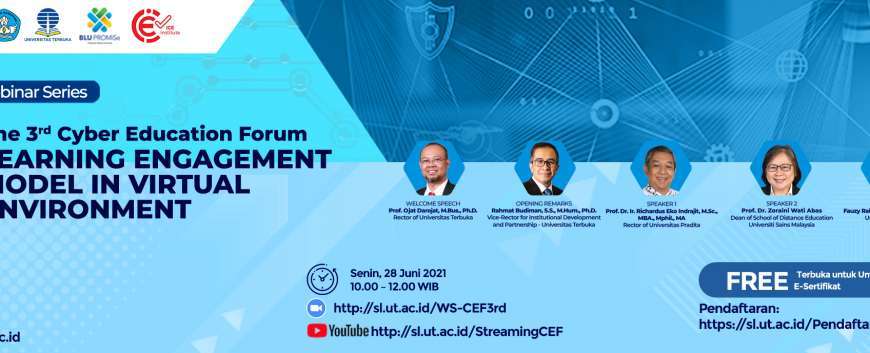- Posted by Hanna Hanifa Varda
- 29 Jun 2021
- PUSAT
- Total View 0
The 3rd Cyber Education Forum: Student Engagement is the Key to the Success of Online Study
Learning Development in Indonesia Network Unit or Unit Pengembangan Pembelajaran Dalam Jaringan Indonesia (UPPDJI) or known as Indonesia Cyber Education Institute (ICE-I) held the 3rd Cyber Education Forum (CEF), Universitas Terbuka (UT). The theme was presented on "Learning Engagement Model in Virtual Ecosystem" with the invited presenters Prof. Dr. Ir. Richardus Eko Indrajit, M.Sc., MBA., M.Phil., MA, the Rector of Universitas Pradita and Prof. Dr. Zoraini Wati Abas, Dean of School of Open and Distance Education, Universiti Sains Malaysia who were moderated by Fauzy Rahman Kosasih, S.S., M.Pd. The webinar was also attended by the UT’s Rector, Prof. Ojat Darojat., M.Bus., Ph.D., and Vice Rector for Institutional Development and Partnership, Rahmat Budiman, M.Hum, Ph.D.
In his notes, Rahmat Budiman said that ICE-I is the market place that can be used to provide online courses. He also added that with freedom to study for all program or merdeka belajar untuk semua, the students can now take up to 20 semester credit units (SKS) from other study
programs (other departments) in the same university and 20 semester credit units (SKS) from other universities, including any university abroad. The advantage of ICE-I offers an affordable tuition fee, and in addition, the courses offered are given in Indonesian Language and English Language, the courses are accurate and verified, the courses offered are from some of the best universities both in Indonesia and overseas, and they have micro credentials, and are dynamic.
UT’s Rector expressed his gratitude for the presenters being able to join the webinar. The Covid-19 pandemic has forced all sectors of life to adapt, including education. UT has used open and distance learning education (PJJ) since 37 years ago in order to outreach its students wherever they are. Until now, UT continues to develop various educational services, such as online tutorial, webinar tutorial, and radio tutorial. It is expected that these services would reach out the students of the millennial generation. He added that, through this webinar, it is expected that it would be able to establish the exchange of constructive knowledge as well as to broaden our horizon in open and distance education (PJJ).

Head of Learning Development in Indonesia Network Unit (UPPDJI), Prof. Paulina Pannen, M.LS., stated that ICE-I has collaborated with various partners of national universities and colleges so that it has been able to produce the scholarship from Minister of Education, Culture, Research and Technology under Freedom to Study Program for All (Merdeka Belajar Untuk Semua). ICE-I has worked together with Edx which provides a wide range of opportunities for 12,800 universities students, 12 online courses, and 14 ICE-I partners. The students are able to make registration from their respective universities. The scholarships can be taken by the students through ICE-I. For further information, please contact the following email address secretariat@icei.ac.id.
Richardus Eko Indrajit stated that the research proposal that will be done together with his team is “Learning Engagement Model in Virtual Ecosystem”. In this research, the main focus will be on measuring the effectiveness of the learning process using virtual ecosystems in terms of engagement as well as any things that will be done in order to ensure the effective involvement in virtual learning ecosystems. The study engagement is the emotional and behavioral abilities of the students in effective learning processes. It can be seen from their active participation, willingness to participate, showing some efforts, feeling motivated and inspired. This study will be measured by filling questionnaire, brain signal censor, and facial micro-expression recognition. This study will target the students of kindergarten, elementary schools (ES), junior high schools (JHS), senior high schools (SHS), undergraduate students as well as graduate and post-graduate students.
Zoraini Wati Abas discussed the Student Engagement in Online Learning. The student engagement is the key to the success of online learning which can be seen from their behaviors, emotion, and cognitive capability. What need to be prepared in order to reach out and ensure student engagement are learning modules that can be independently managed through iModules, online tutorial sessions plus virtual lab sessions, as well as e-learning portals. ICT staff’s roles and sufficient technology facilities are also the support factors for the success of the student engagement, as well as access to the independent learning materials.






